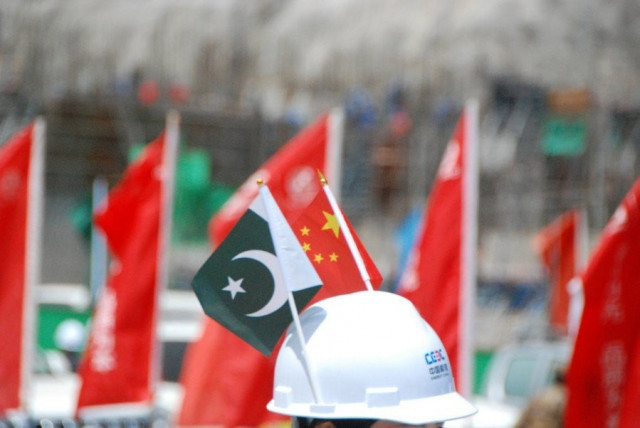China postpones JCC meeting
Decision was taken a day after nine Chinese and five Pakistani nationals were killed in an accident

The meeting of Joint Cooperation Committee – the strategic brain of the China-Pakistan Economic Corridor – was abruptly postponed on Thursday, underscoring the challenges that both the nations have to face due to changing regional security situation.
The decision to postpone the meeting was taken a day after nine Chinese and five Pakistani nationals were killed in an accident, which Chines authorities have described as a bomb attack but Pakistan initially termed it a vehicle failure. The meeting was scheduled for Friday (today).
China was expected to raise the issue of reenergising the CPEC, making the CPEC Long-Term Plan 2017-30 effective and issues being faced by Chinese companies working on the CPEC projects, including a delay in clearing their power generation dues.
“The JCC-10 meeting on CPEC which was scheduled to be held on July 16, 2021 has been postponed to a later date after Eid,” Asim Saleem Bajwa, chairman of the CPEC Authority, tweeted.
He said that a fresh date will be shared when finalised but in the meanwhile preparations continue.
Bajwa on Thursday received a call about the postponement of the meeting in the midst of a meeting that Planning Minister Asad Umar was holding with the provinces to sort out issues before the JCC, a senior official told The Express Tribune. He said that the Chinese were not happy the way Pakistan handled the bus attack issue.
The provision of security to the Chinese nationals and the CPEC assets was also included in the agenda of the 10th JCC meeting. The draft minutes of the JCC suggested that the Chinese were concerned that “changes in regional security situation further the security threats facing CPEC”.
The JCC meeting had been scheduled after a gap of 20 months. The last JCC meeting was held in November of 2019 when Khusro Bakhtiar was the minister for planning.
Planning Minister Umar and China’s National Development and Reforms Commission Vice Chairman Ning Jizhe were set to co-chair the all-important meeting that could have given a serious push to the stalled CPEC.
Pakistani officials have given contradictory statements about the reasons behind the killing of the Chinese nationals.
Read More: CPEC JCC to be held this month: envoy
Information and Broadcasting Minister Fawad Chaudhry said that terrorism could not be ruled out from the Dasu bus tragedy in Kohistan, saying that initial investigations confirmed traces of explosives.
Earlier, Pakistan's foreign ministry said a mechanical failure caused a gas leak which led to the explosion.
On that day, 13 people, including nine Chinese nationals, had died when a coach carrying them to an under-construction tunnel site of the 4,300-megawatt Dasu hydropower project fell into a ravine in the Upper Kohistan area after an explosion.
On July 14, State Councilor and Foreign Minister Wang Yi met with Pakistani Foreign Minister Shah Mahmood Qureshi in Dushanbe and took up the issue of killing of the Chinese nationals.
Yi said the Chinese side was shocked by the serious Chinese casualties in Pakistan, hoping that the Pakistani side could quickly find out its cause, conduct rescue and treatment work at all costs, deal with the aftermath in time, and prevent similar incidents from happening again.
JCC discussion points
The sources said that both the sides were set to take up all issues that caused CPEC slowing down in past three years. A total of 27 projects, 17 fast-track and 10 priority ones had been identified for development under the first phase of the CPEC seven years ago. The fast track projects had been marked to be completed within the first year and the priority projects were planned to be completed within two to three years.
However, after seven years of the CPEC, only four fast-track projects have been completed while the work on the remaining six was under way.
The federal government blames Covid-19 for the slow progress on the CPEC projects but analysts said that the PTI government pushed the CPEC on the backburner as a policy.
Pakistani authorities said that the CPEC has achieved important early harvest targets and is entering a new development stage. The two countries were set to make fresh commitments for speedy execution as per the agreed timelines.
The sources said that there was possibility that both the sides would stress upon the need to implement the Long Term Plan (2017-2030) and to evaluate and “update” it accordingly.
The people-to-people contact, Emerging Technologies Maritime sector, mines and minerals and tourism in K-P, AJK and G-B were the new areas that are being included in the CPEC framework.
Energy Sector
A formal decision was expected to be taken on the inclusion of the 700 MW Azad Pattan hydropower project in the CPEC framework.
So far, nine power projects having 5,320 MW capacity with an investment of $8.2 billion have become operational. Another three projects with installed capacity of 1,920 MW are under construction. Pakistan gets one-third of its power supply from the CPEC projects.
However, the Chinese have expressed concerns over possible change in tax and tariff policies that could undermine Chinese investment in these power plants. The sources said that Pakistan would give commitments to keep the tax and tariff policies unchanged.
The Kohala Hydel Project, Azad Pattan hydro power project, SSRL Thar Coal Block-I 7.8 mtpa and SEC mine mouth power project and Gwadar Power Plant are the next energy projects that will be part of the CPEC.
China has also conveyed concerns over non-payment of about Rs208 billion as of end April to the CPEC power plants by the government.
“The Chinese side hopes to further increase the tariff settlement ratio to ensure the repayment of the bank loan and normal operation of the CPEC energy projects,” according to the government documents.
“As per the agreement on the CPEC energy project cooperation signed in 2014, the Chinese side hopes that the Pakistani side would get the article related to revolving account on the ground soon.” Pakistan had promised to set up the revolving fund to protect Chinese investors from the vicious circular debt cycle, but it did not honour the commitment.
The sources said that Pakistani authorities wanted that the Gwadar Port concessionaire company needed to fast track the implementation of the port operationalisation plan and accelerate development of the free zone.
It is expected that both the sides would announce achieving financial close of the 300 MW Gwadar coal-fired power plant by December 2021. New dates for starting construction work are expected to be four months after signing of the Power Purchase Agreement and Implementation Agreement.
The supplementary agreement for construction of three additional bridges at Eastbay Expressway will also be signed during the 10th JCC.



















COMMENTS
Comments are moderated and generally will be posted if they are on-topic and not abusive.
For more information, please see our Comments FAQ